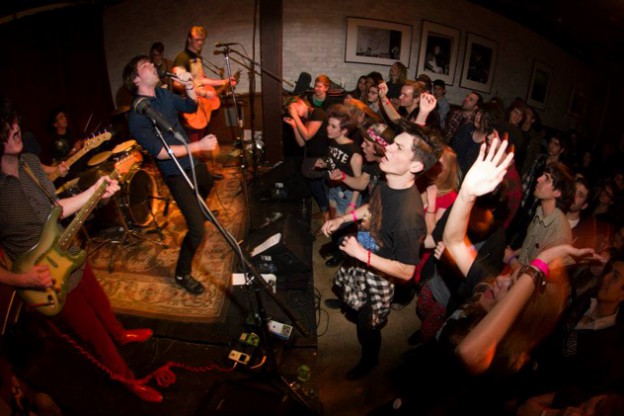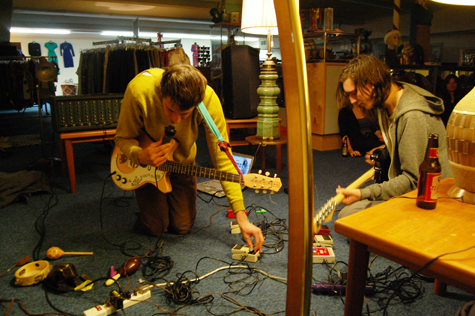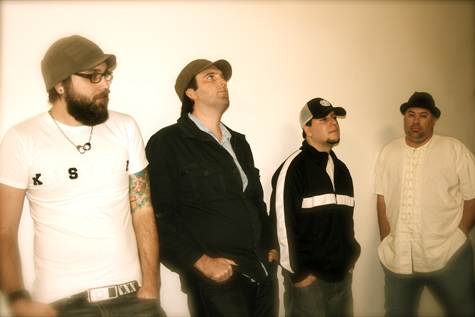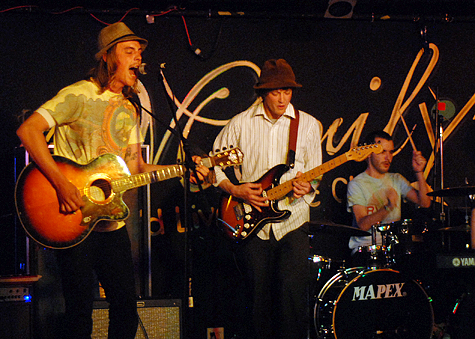Luigi’s Slice, a hip pizza joint in the MARRS Building that for years has also acted as one of Sacramento’s few all-ages music venues, has been sold to the owners of Azul Mexican Food and Tequila Bar, located just steps from Luigi’s in the same building. The space will close for about three weeks starting on May 17, 2014 and will undergo renovations. It will remain a pizza place under a new undisclosed name, but it is uncertain if the new owners will continue to host live, all-ages shows.
“It’s heartbreaking about the uncertainty of the new owners doing music,” Luigi’s co-owner Linda Brida (she runs the business with her husband, Greg) recently told Submerge. “I’m going to talk to them more about it.”
Brida mentioned that while it’s a bummer they have to sell, it is something they’ve been mulling over for some time. “We’re a mom and pop shop, and we treat our employees like family,” she said, noting how important it was to them that most of their employees be re-hired by the new owners. The Bridas still own the original Luigi’s Pizza Parlor located at 3800 Stockton Boulevard. It’s been in their family for 60 years.
Local promoter and music scene OG Jerry Perry, who frequently throws all-ages shows at Luigi’s Slice featuring both national and local acts, wrote an honest straight-forward post on his Facebook page on April 12, 2014, about the closing of Luigi’s and the uncertainty of live music happening there after the switchover.
“I consider little ol’ Luigi’s to be one of the most important rooms in the Sacramento scene,” he wrote going on to say “Sacramento may not know it yet, and actually rarely ever understands the impact of changes such as this, but losing this venue will create a huge disconnect between young people and live music in the scene, and forces so many young local artists back to playing stageless coffeehouses, or bullshit pay-to-plays, maybe occasional house-parties, or nowhere at all.”
Submerge attempted to reach out to one of the owners of Azul but did not hear back as of press time. We reached out to Perry to see what he and others have lined up at Luigi’s before May 17, and it turns out it’s a stacked next few weeks of awesome shows, so get out and support while you can! Check it: Circle Takes the Square on April 25; The Kelps on May 3; Sun Monks on May 9 with The Horde and The Harem; Kurt Travis (of A Lot Like Birds) on May 14; and The Dollyrots and Slime Girls on May 17, which may be the final night of shows. Perry also told Submerge that he’s adding more shows to that list and that he plans on reaching out to the new owners to speak with them to discern the future of all-ages shows. We’ll keep our readers up to date as we learn more about the fate of the venue.
DJ Shaun Slaughter Talks his Trade as Lipstick Turns 10
Words by Adam Saake – Photo by Matthew Burks
A jazz album plays in the background of Shaun Slaughter’s Midtown apartment as I sit down to discuss the 10-year anniversary of Lipstick, his indie dance club at Old Ironsides here in Sacramento. I guess maybe I expected a Phoenix song to be playing, or something along those lines, but then it all makes sense.
“I don’t want to have to play ‘1901’ ever again,” says Slaughter, half-joking. “I love that song, but I love it so much that I don’t want to play it so I don’t ruin it for myself.”
It’s like making burritos all day: you don’t hate burritos you just don’t want to have one right when you get off work. Alright, bad comparison. Indie rock isn’t really like burritos. But imagine for a second that Slaughter and Lipstick-partner-in-crime, Roger Carpio, are the tortillas. Wrapped up inside of these two musical encyclopedias is a plethora of songs that each have dug up from the depths of record bins and music blogs to play for a finicky crowd, week after week, year after year. Maybe you can’t eat Mexican food every day, but many faithful Lipstick-goers show up damn-near every Tuesday to see what the boys have drummed up now.
It wasn’t always as packed as it is these days; it was a bit of slow climb. And in the beginning it wasn’t always just Slaughter and Carpio. The original Lipstick lineup consisted of four DJs who all had very different ideas about how the night should sound. But what unified them was one simple idea–make them dance.
Slaughter was friends with a fellow house-head named Chad Nardine. Both he and Slaughter were new to downtown. Slaughter himself was a kid from the suburbs and barely 21, and they were given a slot at the Press Club to DJ. They cut their teeth there for a while but frustrations with the manager and too many randoms walking in requesting Madonna had them looking elsewhere. They were then approached separately and asked to DJ at Old Ironsides on one fateful Tuesday. Realizing they had both been solicited for the same gig, they of course decided to do the night together.
“Our first Tuesday ever was just Chad and I, and it was all electronica and it bombed,” says Slaughter. “No one was there!”
The two needed to revamp, so they went back to the drawing board to figure out how they were going to put together a better club night that would hit. The two of them were growing tired of DJing dance music and Slaughter had a taste for older alternative rock like the Rentals, Weezer and Sonic Youth. Nardine picked up on this and told Slaughter about Carpio.
“Chad said, ‘I have this friend named Roger who’s really into Britpop,” recalls Slaughter. “And I had no idea what that even meant.”
Carpio added his own ideas to the sound of the night and each peppered in their unique styles. To round out their indie rock dance night, Roger brought one more DJ into the mix.
“Then Roger said, ‘I know this guy Sean Meyers who DJs really good ‘60s rock.’ We heard him play this set one night, and it was just amazing. We added him on and then it was the four of us,” says Slaughter.
During that first year of Lipstick at the Press Club, the four played to lackluster response and were perfectly OK with that. The few that showed up showed support the best way a DJ could hope for.
“It was good, and we were happy with 30 or 40 people,” says Slaughter. “We couldn’t believe that people would dance to it.”
Nardine eventually ended up moving away and Meyers excused himself to pursue other endeavors. That left the two DJs, Slaughter and Carpio, who couldn’t have been more different from each other. But what at first may have seemed like a duo doomed to butt heads, disagree over music choice or altogether fail as partners ended up being the exact right pairing that would keep Lipstick running after all these years.
“We were both really particular about how the night went,” explains Slaughter. That’s why…it’s been around so long. Both of us were really stuck on the fact that it had to be a certain way.”
And that certain way was “some indie, Britpop and some old stuff” as well as no guest DJs. Whatever they were playing, they were doing something right and that mindset of sticking to a format was the foundation that drew in crowds night after night. Over time, though, the box they DJed inside of eventually proved to be too small and it was time for more legroom.
“I think that if we would have stuck with that, it would have just died out, because ultimately people don’t want to listen to the same stuff,” says Slaughter.
So again, what the two shared in common was what kept Lipstick new and interesting over the years. Their shared passion for discovering new music coupled with Lipstick happening every week made for the right motivation to keep introducing the dance floor to new bands.
“Roger and I are super avid. All we do is dig for music and listen to new stuff,” says Slaughter.
At times it can be “a double-edged sword” Slaughter says, hand on his chin and thoughts on his mind. Keeping the night always new and always changing is fun when you’re a DJ because you’re never playing anything out. You’re able to keep a song like “1901” for your own enjoyment. Yet, certain songs are guaranteed to pack the dance floor and in the end, isn’t that your job as a DJ?
“You’re doing people a disservice if you don’t play some of that stuff,” says Slaughter. “You do it every Tuesday and you’re thinking, ‘Fuck! I’ve heard this song so many times.’ But then I think about the people who haven’t been coming every week and how excited they are to dance to a song they’ve never heard before.”
It’s rare for anything in the music and art scenes to last 10 years, let alone a club night. People change, bars close, relationships go south. It’s just the way it is. For Lipstick to have endured 10 years on an ever-changing music scene and all the while under what seems like constant scrutiny from naysayers calling Lipstick a club night for “hipsters,” is pretty amazing. This common misconception is immediately squashed when you walk through the doors on any given Tuesday. It’s a shot in the dark as to whom you’re actually going to find inside at the bar. Most likely you’ll find those same naysayers who are socializing with the “hipsters” while buying shots for your introverted co-worker from the office.
“We’ve gone through so many waves,” explains Slaughter. “Roger is like, ‘Dude. How many times have we gone through this?’”
Maybe that’s why Slaughter and Carpio have stuck it out all these years. Keeping the crowd showing up is one thing, but keeping themselves interested is another. But when each year brings a new crowd, with new friends and more good times to add to the memories, it makes it easier to stick around. Plus, Slaughter and Carpio switch it up around town and have been behind the wheel of many other successful, and most importantly, just really fun club nights around Sacramento. One of their most popular nights, FUCK Fridays at the Townhouse Lounge, is their sort of alter egos where they can completely let loose. Here they promote a “let’s lose our shit and go completely crazy” attitude while Slaughter is dressed up as say, an M&M or a rat costume [pictured].
What people don’t always realize is that many DJs and promoters in Sacramento, including Slaughter and Carpio, have their finger on the pulse of what’s good in the music and club scenes around the country. Slaughter frequently travels to other cities to DJ, and when he returns he brings back with him the best ideas he’s encountered to apply to his own club nights. In the words of Slaughter, “We stole everything from somebody.” Although, I prefer borrowed, for what are ideas without inspiration?
“Everyone always thinks there is something better,” says Slaughter. “Compared to a lot of other cities, we’re actually doing pretty well. The nights we’re throwing are really current.”
Recently, Slaughter has been focusing his energy on the production side with a new project called D.A.M.B. that just got picked up by DJs Are Not Rock Stars Records. “Daylight,” his first track released, plays with samples of Harry Belafonte’s “Day-O” backed by a tropical house beat. His second track, “Waiting,” has already been remixed by the LOL Boys, Mom & Dad and Wolfie and has found its way around a number of high-traffic blogs. Not too bad for his first two tracks. We’ll see where it goes in the coming months, seeing as how Slaughter has his hands pretty full booking up-and-comers for FUCK, scouring the Internet for Lipstick and doing the graphic design for all his flyers. It’s a lot of work, but he’s managing to make a living doing what he loves.
“I’m definitely super, super happy. I could be playing Top 40 every night,” says Slaughter. “I get the privilege of DJing with Roger too, and I get to hang out and get paid to do something amazing. I think it’s insane that after 10 years people are still there.”
Here’s to another 10.
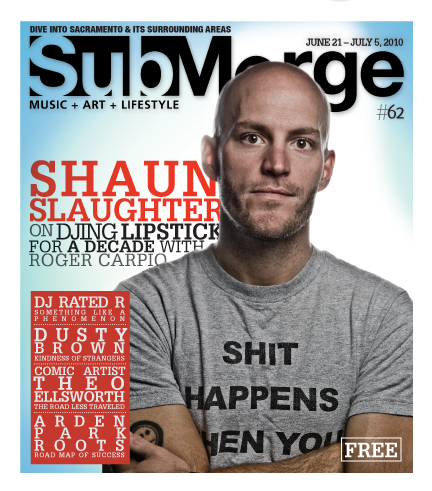
Check out Lipstick Tuesday nights at Old Ironsides. For more info, go to www.blasefaire.com.
Sacramento music wunderkind Michael Franzino talks A Lot Like Birds
Words by Julie De La Torre
Photo by Daniel Dare
[audio:02 Hallows or Horcruxes_.mp3]
A Lot Like Birds isn’t, well, a lot like anything else you’ve heard before. Starting out as a two-man project led by frontman Michael Franzino, the experimental group soon picked up five additional members and hasn’t looked back. Since winning the Jammies with former band She’s a Dead Man in 2007, the precocious 20-year-old has not only grown up mentally, but musically, as well.
Submerge had the chance to chat with Franzino about everything from his main sources of inspiration to what it was like recording an insanely sophisticated debut release in the confines of a suburban living room. With their ball-busting stage presence and new full-length album, Plan B, A Lot Like Birds is proving to be one of the most promising up-and-comers of 2010.
So, first off, what are you trying to accomplish with A Lot Like Birds that’s different from your other musical projects?
In my previous and first band, our appeal lied solely in our live shows, due to youthful inexperience and naiveté in musicianship and our wildly eccentric and strong stage presence. People came to our shows to dance or laugh at how silly we could be. A lot has changed in my life in the two years since the demise of She’s a Dead Man, and a hell of a lot has changed since the beginning of it four years ago, when the majority of that music was written. It’s kind of like being a senior laughing at your goofy freshman self in retrospect. I’d like to think (or hope, really) that A Lot Like Birds gives people something stimulating or moving to listen to, while we lose our fucking minds on stage night after night.
What were your biggest challenges while recording Plan B?
That would most definitely be the drum programming process, which took five of the nine total months in the studio with the great Jack O’Donnell’s Shattered Records. I basically had a big MIDI spreadsheet before me with every possible beat and every possible drum and cymbal where I had to dictate, as a guitarist, every single drum note and how hard it was to be hit. That, and we had all kinds of nail-biting computer troubles; Jack never expected to record songs with over 100 tracks.
What have you taken from this entire experience? What have you learned since your days of winning the Jammies in high school?
What I learned most from this experience was the recording process really, and how to utilize it as another dynamic in my music. There are all kinds of tricks [and] ways to change moods or make parts sound bigger or spacey or creepy. Utilizing effects and compression appropriately can really make a song or part something different. There’s so much more to making a record than people think; it gives me such a new love for the albums I revere.
It seems like the album has a lot of Mars Volta/At the Drive In inspiration behind it. If so, how does that come into play? What/who are your main influences?ÂÂ
Omar Rodriguez-Lopez is certainly a hero of mine. If I take anything from the man, it’s a driving insistence upon challenging myself and an audience. Using chaos and discord to contrast gentle and beautiful or making tension and anxiety in a big build are some of my favorite dynamics, and Omar is a master of them among many other things. If the music I write is influenced by anything I can articulate, it’s moods or phases in my life. The past few years in which Plan B formed in my head were some of the darkest times I’ve seen. I think you can hear it in comparison to my embarrassing former work.
[audio:05 Your Ex Marked My Spot.mp3]
What was it like to record with 10-plus musicians?
It’s absolutely amazing. I wouldn’t have it any other way; I like big compositions with all kinds of layers to tear apart and fall into. I’d be tragically bored in a typical three-piece rock band. The performances I witnessed in Jack’s studio were absolutely beautiful. Most of these guest musicians came in without hearing the music once and laid their parts down in one to two takes. I could not be more grateful to have such helpful and incredibly talented friends.
This album was very reminiscent of a rock opera—was that your intent?
It was not, but I had certainly hoped for the songs to flow well into each other and for it to be an album, not just a collection of songs. I think there is a difference; each song on the album is intentionally placed where it is.
Describe the live show of A Lot Like Birds… What do you think sets you guys apart from anyone else right now?
Our live show was an interesting entity to orchestrate, with the album consisting of so many musicians and all. Originally intended as guests on the album, Cory Lockwood, screamer; Ben Wiacek, guitarist [of post-hardcore project, Discovery of a Lifelong Error]; Athena Koumis, violinist [of folk-rock project, Life as Ghosts]; Juli Lydell, vocalist/keyboardist and Tyler Lydell, drummer [of experimental-folk project, The Dreaded Diamond] have all banded around myself and bassist Michael Litterfield. Making us seven strong, there’s rarely a time when you don’t have something to watch. We arrive to shows with every intent to walk off stage extremely sore, sweaty and out of breath.
What are your plans for 2010? Any ideas for a tour or additional albums?
We are going in to record an acoustic EP called Fuck Morrissey within the next two weeks and after that another full length, because if this took nine months to record, only God knows how long the next one will. As far as touring, we are most definitely going to tour at all costs this summer, hopefully with the backing of a label or management company, but DIY will suffice.
Any last words?
Yes, please listen to the bands whose musicians were guest on this album, including: The Dreaded Diamond, H. Letham, Life as Ghosts, Discovery of a Lifelong Error, Zuhg and our friends The Speed of Sound in Sea Water!
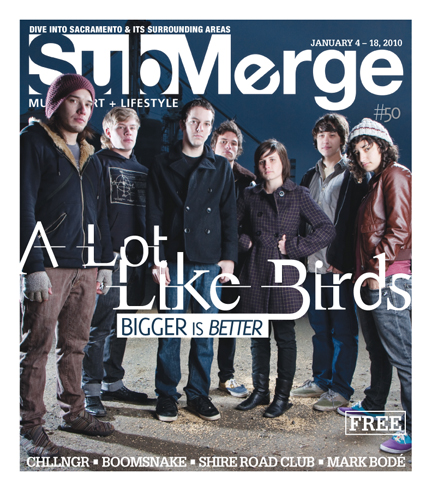
A Lot Like Birds headlined Jan. 16 at the Shire Road Club in Sacramento.
To find out when and where they’re playing next check out www.myspace.com/alotlikebirds
Bows & Arrows secondhand hipster apparel boutique is not known for its live entertainment, but the dozen or so hip enough to be in the know got a brief, but aurally excitable performance from Placerville’s Pregnant Dec. 3.
Formerly grid kids, Pregnant moved out to the sticks, possibly to their greatest benefit. Their album, Liquidation on Swans, is a complicated experience. Bountiful in picturesque collages, the record will rack your brain in wonderment as to where Daniel Trudeau found these sultry sounds—which is why seeing Pregnant perform is such an enlightening delight.
The Bows & Arrows atmosphere complemented Trudeau and his guitar-strumming assistant, Michael Saalman. The lights were turned off except in the small floor space, cleared for their instruments. The band played in the lighting of kitschy lamps for sale, while onlookers sat on the floor, giving these living room scientists a fitting workspace to kneel among their array of pedals and build each song from scratch.
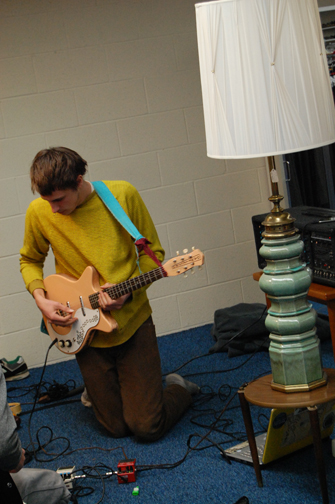
The joy of watching Pregnant comes precisely from that. Saalman noodled at his guitar endlessly, while Trudeau methodically looped each piece of his instrumentation into the fold. Trudeau beatboxed, pitch shifted his voice into kooky layers and strummed a wooden lizard to complete the steps of “Do That.” He created bass from rhythmically breathing heavily into the microphone, tweaked a kazoo into a swarm-of-bees buzz, and skronked on a saxophone, proving his talents beyond the junkyard noise. The scatter of percussion tools on the floor and the effects pedals were all utilized to steadily bring each song to fruition. The sound was reminiscent of Brooklyn-based noise bands like Say No! To Architecture, GDFX and Zs. However, Pregnant is inherently California freak folk. Those Brooklyn kids are all harsh noise from buzz saw reverb and nose bleeds, while Pregnant is countrified and tender. Birds chirp, wind chimes made of bones jingle and the warmth is candid.
There’s nothing to fear in a Pregnant record and that kindness is present in their performance. The duo never acknowledged the audience, far too engulfed in their process, but once they finished, they thanked us, awkwardly bowed, locked hands and dry humped a lamp.
Pregnant plays traditional venues, but if you have the chance, see them in a living room, a boutique or a basement. Make sure there’s carpet and a place to kneel. It’s best to be as comfortable as the musicians, which means removing your shoes and letting those toes wiggle a little.
Life in 24 Frames takes a progressive approach to their music, in more ways than one
It’s time the music industry faces the truth that soon the CD will be an obsolete technology. While it is heartbreaking that record stores might disappear as well, it’s impossible to deny the power and ease of the MP3. With this in mind Sacramento’s Life in 24 Frames has developed a clever marketing strategy as an act of accepting these changing times.
The download card is so new it feels awkward. Life in 24 Frames use these business cards with download codes to spread the word. No physical copy exists of the band’s music; rather demand is created through limited time offers on its Web site. The response has been mostly enthusiastic, but the band worries that perhaps there is something lost in translation when they give out cards to fans.
After a show in San Diego, the band was loading up when a girl looking to purchase the band’s music approached. When the lead singer Kris tried to give her a card, she respectfully declined, saying she would prefer to buy a CD. “I don’t think she understood what it was,” he said. “I think she thought I was trying to pick up on her. Not a week later I gave someone a download card and he said, ‘This is sweet, but do you have anything I could buy?'” Tony added that given this economy they never thought people would be so insistent on buying a record instead of getting free music.
Eventually Life in 24 Frames will compile its songs onto a CD. The band hopes to have it completed by the spring or summer of 2010. Until that day though, they are continuing the awkward exchanges in hopes that the cards will catch on. Kris said having a pocketful of cards excites him, as he’s often been tempted to make it rain cards on the audience, but can not justify wasting free downloads.
Life in 24 Frames expressed a focused approach to its writing process. The cards make it a task to have three new songs available every two months. The drummer, who simply goes by Mango, said the band has set a standard that requires discipline.
“There’s nothing worse than when your favorite band takes two years to put out a new album,” Kris said. Life in 24 Frames is constantly writing to maintain fan interest in this digital age where music is available with just a click.
“Some bands can do that,” lead guitarist Tony C. said in reference to taking years between records. “But, obviously with a new band like ourselves, we can’t afford to do that.”
As for their sound, Kris admitted the band has yet to write a song under five minutes. Life in 24 Frames has an experimental sound that builds toward ethereal crescendos.
“None of it is intentional at all,” Kris said. “We never go into the studio with the plan of making a seven-minute epic, but we also don’t stop building the song until everyone is comfortable with their part.”
The band often gets comparisons to Radiohead and Pink Floyd, but the members came together in their appreciation for ’90s indie rock like Built to Spill and Sunny Day Real Estate. Mango was the last member to join. He heard Life in 24 Frames’ first EP and immediately envisioned playing drums for the band.
The bassist Wes said the band hopes to eventually achieve that perfect pop song greatness, referencing The Beatles’ “Happiness Is a Warm Gun” as an example of fitting dozens of great ideas into the three and a half minute pop mold. “They are long songs, but they don’t feel like long songs,” Mango said. “We don’t focus on how long it is. They all have to reach a specific energy.”
Life in 24 Frames said it came to terms with its current sound four months ago. Wes said despite each member having different backgrounds and playing in bands that sound nothing like Life in 24 Frames, they all seemed to be arching toward this moment. “I’m sure we won’t be the same band a year from now,” he said.
Press so far for Life in 24 Frames has the band adopting a bad publicity is still publicity mentality. One show review that amused them in particular was after a last minute scheduling in San Francisco. The reviewer that night trashed the band for having an atmospheric sound that did not translate to the live setting, suggesting that the band be best enjoyed while doing homework, making out or falling asleep. Despite the writer’s intentions, Life in 24 Frames considered the remark a compliment.
From its inception the band has been based around technological savvy. The members all met on Craigslist. Kris joked that whether you’re trying to sell your lawnmower, need a girlfriend for the night or a new drummer, the list will fulfill your needs. Kris has a background in video production. Life in 24 Frames hopes to eventually incorporate video into its recording sessions, but he quickly admitted that filming and playing music at the same time is a difficult task. It did few favors for The Beatles when they attempted to document its Let It Be sessions and Life in 24 Frames are aware of those concerns. “When you’re part of the music writing process there’s absolutely no way you can also from an outside perspective to film it,” he said. “I would like to shoot one of our long drives back from Los Angeles as a music video.”
Mike Farrell, Lite Brite
Old Ironsides “¢ Wednesday, Nov. 25, 2009
Words by Adam Aaake “¢ Photos by April Fredrikson
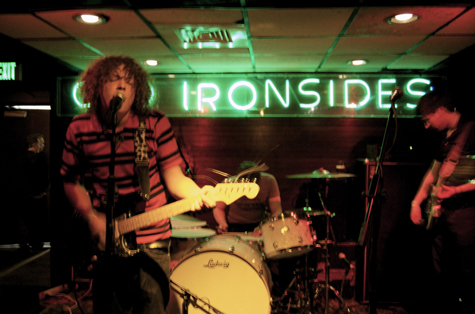
In our last issue, no. 47, local musician and show promoter Ira Skinner said that “Sacramento’s music scene is probably in the worst condition that I’ve seen it in my life.” Sadly, I’ll have to agree with that. But in the season of giving thanks and on the eve of our nation’s holiday, I was thankful for the bands that are continuing to kick ass year after year, night after night.
A crowd of over a hundred gathered inside the warm walls of a familiar Sacramento venue that happens to be celebrating its 75th year of operation—Old Ironsides. Jerry Perry, another icon of our local scene and the man responsible for the majority of the booking at Old Ironsides for the past who knows how many years, has put together an all-star series of shows featuring the best acts our city has to offer. Last Wednesday’s bill began with a block party set from the always entertaining Lite Brite. Imagine Buzz Osborne with a voice like Howlin’ Pelle Almqvist, a drummer from the school of Tom Bonham and a bass player with a warm and fuzzy Rickenbacker; throw in a solid lead guitar player and you’re close to their sound. Their opening song, “Space Shuttle” lifted the crowd from their seats and had them orbiting around the stage like well lubricated satellites. Singer Eddie Underwood was belting lyrics through his thick, dirty-blond hair that sprawled across the front of his face, flailing his arm to the ceiling and arching his body forward as a he played an arpeggiated guitar riff with his free hand. An exhibitionist? Maybe. Pretty bad ass? Definitely.
Their fourth song in was ghostly reminiscent of Far circa Tin Cans With Strings to You. What added to this poltergeist was Far bass player Johnny Guttenberg looking on from the side of the stage. Later he would play with Jackpot, who was also on the bill that night, so I guess it wasn’t too strange. It’s great to hear and see the influence that a great Sacramento band like Far continues to have on the current scene.
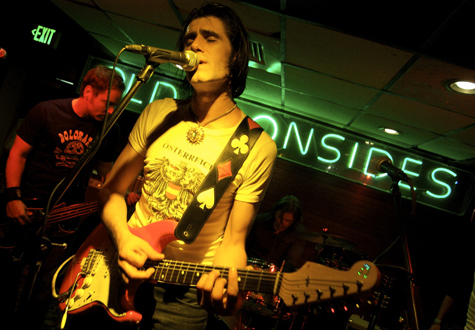
A skinny-framed man with a tight fitting white T-shirt and a thick head of greasy brown hair that was slicked back over his head approached the stage. He slowly picked up his guitar and slid it over his shoulder in a routine manner, adjusting the leather strap that was decorated with the suits of a deck of cards. A dense crowd was surrounding the stage at this point and it was clear that they were here to see the next act. His name was Mike Farrell and he needed no introduction. The second his guitar was strummed and the set began, the experience and tenacity of Sacramento’s guitar legend proved true once again. This time with his own band, Farrell played a set of grimy rock ‘n’ roll tunes that were layered with keys and violin from the talented multi-instrumentalist Liani Moore. Veteran drummer Mike Curry did his thing on the skins while keeping the back end pocket with bass player Shawn Hali.
This performance was all about Farrell, though. When he solos you listen; touching every part of the guitar and producing sounds from his instrument that seem otherworldly. He raised his hand over the guitar as it hummed, controlling it like a shaman—he owns its soul. His mouth pursed, and he stepped to the microphone and muttered his lyrics, more concerned with the noise of his chord that continued to linger.
His music is a rare fixture of the scene that we as the local fans have the pleasure of seeing, and that, my friends, is what I am thankful for. I am thankful for the huge crowd that gathered on a brisk Wednesday to support a bill of favorites and a venue that has housed the sounds of thousands of bands over the course of its live music lineage.
Tonight, Ira would be proud.
Mt. St. Helens Vietnam Band has the heart of a teen, literally.
“We didn’t necessarily know what we were getting ourselves into,” explained Benjamin Verdoes, co-founder and lead singer of Seattle, Wash.-based Mt. St. Helens Vietnam Band. He talked over the group’s timeline as he waited patiently for wife and band mate Traci Eggleston to pick him up so they could head to the studio; there, they’d work out percussion kinks for the newest record. This has been Verdoes’ daily schedule as of late: work, then studio.
At this point, all the ideas have been born. The songs have all been written in full and are in the Mt. St. Helens repertoire. Verdoes has been anxious to get them recorded. Now they’re laying out a lot of basics, getting the skeleton of the album built so it can be out by early 2010. They’re progressing, but what’s left is “a lot of little details to fill in,” Benjamin said.
They might sound like old pros at this, but this is an incredibly young group. In fact, that’s essentially what Mt. St. Helens is known for: their youth, belonging in particular to their 14-year-old drummer (and Benjamin’s adopted younger brother), Marshall Verdoes.
“He kind of blows people’s minds every time they see him,” Benjamin said. “He doesn’t even necessarily look 14, and when people find out how old he is they’re genuinely awestruck.”
Mt. St. Helens actually started as just an idea between the Verdoes brothers. When Marshall was young (or younger”¦), Benjamin would bring him along to all the shows he attended, and Marshall would incessantly try to convince Benjamin that they should start a band together. Benjamin slowly started teaching him some tricks on percussion, and was impressed by Marshall’s quick knack for drums.
Benjamin had been involved in other various bands, but after watching his younger brother progress so fast and accurately on drums, he decided to experiment. The two began a project, roughly four years back, as a pair sparking fire for the first time.
“In some kind of form, in some rough primordial state, it was just us playing riffs,” Benjamin said.
It wasn’t until fall 2007 when the lineup became a quintet, including Matthew Dammer, Jared Price and Eggleston.
From the start, there was a lot of quick buzz surrounding the group’s odd approach to hyping their new creation. They made a Myspace page, but didn’t actually post any samples of their music, opting instead for comical blips and parodies that did not relate to their music whatsoever.
“We kind of, through this series of accidents, came up with this thing where we didn’t post music,” Benjamin explained.
The brothers hadn’t landed on a solid demo yet and were in transition from a two-piece into a larger group. Even if they were posting purely to stall for time as the group took form, it worked. Mt. St. Helens gained a ton of interest; enough that at their first show, there were hundreds of awaiting bodies.
“It was an interesting reaction that we got, so we definitely played into it,” Benjamin said.
Things continued to go well, enough so that Mt. St. Helens went from something of a fling to a full-fledged affair. Comparisons in sound were made with bands such as Wolf Parade and Modest Mouse, thanks in part to the driven scratch of Mt. St. Helens’ urgent guitar chords, swelled by slaps of cymbal and other smack percussive movements, exemplified prominently on songs such as “Albatross, Albatross, Albatross.” Impressive, catchy licks with Benjamin’s lightly fuzzed-yet-piercing vocals are displayed nicely on “Anchors Dropped.”
Mt. St. Helens spent the last year touring across country and playing from their self-titled album (which came out in mid-March), which consists of a lot of Benjamin’s older material, mostly songs quilted together with years of pieced ideas. They’ve also been debuting selections from their upcoming release.
Whenever they can find spare moments, be it on a long stretch of freeway in the van, or at pit stops or cafés, Benjamin and Eggleston take turns helping Marshall with his schoolwork. This wasn’t a choice based purely on touring. A few years back, Marshall realized it was much easier for him to get schooling done on his own, away from the traditional school scenario. Benjamin was already helping Marshall with his schoolwork, but volunteered to take on the role of teacher as well. Even off the road, Benjamin and wife Eggleston take turns helping Marshall with school while the other works a part-time job.
Between the commitment to the band, the family tie and the schooling, the Verdoes brothers are virtually inseparable. Luckily, they have a tight bond.
“I spend almost every waking hour with him it seems like, for the last four years,” Benjamin laughed.
For most kids, the kinds of distractions presented by being a traveling musician and still getting school work done would be too much; but the environment has worked well for Marshall, Benjamin said.
As far as the live shows themselves, it’s still a real treat for audiences to see a youth so precise and talented on drums.
“We work really hard on it, but he definitely has a real gift for it. It’s really cool to watch,” Bejamin said in praise of his younger sibling.
Benjamin still finds himself having to pull his brother’s I.D. out for proof of that he’s underage.
“People—they’ll argue with me, they’ll be like, ‘He’s not 14,'” he said.
For the time being, they’ll be touring through the West Coast and finishing up in the studio, still somewhat curious of their own next step.
“It’ll be definitely interesting how this next record comes out in the spring,” Benjamin said. “How we transition into this real, band, I guess.”
Local Promoter Brian McKenna Prepares for His 40th Birthday and his 20th Anniversary Booking Shows in Sacramento
Twenty years ago, Brian McKenna was a record store clerk, dropping flyers to his shows at the Cattle Club in every bag of records out the door. Now, McKenna is 20 years of promotional work deep. He’s booked every band you love, gathered two lifetimes’ worth of stories and still makes time for shows he doesn’t book. McKenna is a grown man looking at 40 years of life and still spends his days digging for new music that will blow his mind.
McKenna books everything. He’s seen the coming and going of trends like they were cars viewed from the side of a freeway. According to his promotional company’s Myspace page, Abstract Entertainment has booked every variety of band falling between Ani DiFranco and White Zombie. In his younger days, he was booking more than 100 shows a year. With no signs of letting up, McKenna lives in venues. His weekly regimen might range from nights at the Blue Lamp with Lyrics Born to awkward looks from hipsters at The Hub.
In the early ’90s, he brought Mudhoney, Pearl Jam (when it was still known as Mookie Blaylock) and Nirvana to Sacramento before the term “grunge” was coined. He heard songs from acclaimed records like Ten and Nevermind live in dingy low-ceiling holes, before they became platinum records. “Most folks don’t think Nirvana ever played Sacramento,” he says. “They played here three times. But, it was before Nevermind. The best shows you’re going to see from a band, arguably, are when they’re young and hungry and haven’t had a hit yet.”
His show obsession is unquenchable. “I’m at the shows I book, but on my nights off I’m typically at another show,” McKenna says. “When I go to another city, I’m grabbing all the weeklies to see who’s in town. I could be on vacation, whatever; there might be somebody great.”
Once, on a brief vacation in Prague, he did resist the temptation to drag a girlfriend to see a band he’d previously worked with. If it was a band he loved, he asserts, they would have gone. “I don’t date people who aren’t into shows,” he says. “They will quickly realize I will sacrifice quite a bit to go see a good show.” If he ever lost that willingness to sacrifice he’d get a straight job, McKenna concedes—but it’s a knee-jerk response. He wears his loyalty to independent music as casually as his jeans and flannel.
As an independent business man, McKenna’s never taken a corporate sponsorship, preferring to be the provider of his own means. Though he had offers along the way to join the suits, he stayed local in hopes the Sacramento scene would blow up. “I really didn’t want to be punching the clock and putting on a suit and a tie,” he says. “I’m probably better off making my own hours, my own schedule and not answering to anybody.”
McKenna decided to become his own boss after Spirit Records in Rancho Cordova closed. He started Abstract Entertainment in 1994. He might not have pulled a Jim Brewer-style “who’s coming with me?” speech, but he did coax two former Spirit employees to join him, one to be his box office manager and the other to be his production manager. “I worked with those two guys until 2000,” he says.
McKenna’s weathered his share of storms and has elected to see the current economic crisis’ effect on the scene as just another challenge to endure. “The people who are going out to small club [and bar] shows are a really finite number,” he says. “It’s affected by the night of the week, what’s on TV. Even with TiVo, you’re still competing.”
It does not help that Sacramento is a city with its back to the youth, the people who go to shows the most. He’s far past the twilight of his youth, but the memories of being shut out from the venue hosting his favorite band lingers. McKenna laments the loss of all-ages venues, like his first employer, The Cattle Club, and the El Dorado Saloon.
“Unfortunately, the powers that be in our government town are not open to the idea of an all-ages venue,” he says. “They don’t look at it as a chance to keep kids off the streets and out of trouble. They look at is as ‘there’s kids out here listening to music I don’t understand, so it can’t be a good thing.’ Why not have a safe place for them to go?”
McKenna admits his own hesitation to jump into the all-ages movement. Sacramento’s 18-and-up venues are the exceptionally large Empire club and a collection of small pizza parlors and coffeehouses holding a maximum of 100 people.
“A lot of the bands I [book], it’s just too small for them,” he says. “I’m not going to hold my breath waiting for the ideal venue that holds 500 kids of all ages and allows 21-and-up to drink to open in Sacramento proper.”
After a return from Burning Man over the summer, McKenna is now preparing for his End of My 30s tour. His birthday week plans include a road trip from San Diego back to Sacramento, following Jesus Lizard, Butthole Surfers and the Melvins through California. The tour concludes with his 20×40 show, an event celebrating 20 years of promotion on his 40th birthday.
“I put Harlow’s on hold a year ago,” he says. “The idea was I wanted to take some of the bands I started with 20 years ago and all bands I truly love and travel to see if they are playing within a 100 miles to commemorate the anniversary.”
He is bringing in Canadian punks No Means No, who made Sacramento its anchor date; mid-’90s local band Kai KlN; and new blood Triclops. With a little luck, he was even able to steal Mike Watt away from Iggy Pop for the night.
“He’s a friend and the first time I set foot in Cattle Club, it was to see him in Firehose,” McKenna says. “I sent an invitation to him, but understood that if Iggy says the Stooges need to be in Germany, Mike Watt will be in Germany. Time went by and he called me up, asking if it was too late to get on the bill. I had the show booked, but I couldn’t tell Mike Watt he’s too late.”
Music & Games Night : In Leaves, Owltrain & Musical Charis
Wednesday, March 18, 2009
Marilyn’s On K, Sacramento
Sometimes when bands break up and members go their separate ways to form new groups, their fans are treated to twice the amount of music. An obvious example would be The Mars Volta and Sparta rising from the ashes of At the Drive In’s breakup in 2001. Such was the case when Sacramento-based pop-rock band Self Against City imploded in late ’08, catapulting the members into two different groups that would later come to be known as Musical Charis and Owltrain. It wasn’t the nastiest of breakups, but it surely wasn’t the prettiest either. On Wednesday, March 18 the split factions of what was once Self Against City were brought together at Marilyn’s on K. Would there be fireworks?
Musical Charis took the stage first. The two core members of the group are Blake Abbey (formerly of Self Against City) and Jessie Brune (also a very prominent local singer/songwriter); throughout their set, different musicians joined them and played various instruments. After somewhat of a slow start, the band really started to pick things up when their drummer joined in on the third song, giving the audience something more to groove to.

Highlights of the set included Abbey talking a whole bunch of crap about his former bandmates in the room (awkward yet hilarious) and the performances of crowd favorites “The Life,” “Anatomy” and their set closer “Baby Blue.” All in all, it was a great musical performance that showcased the musicians’ many talents from Abbey and Brune’s beautiful vocal harmonies to their great songwriting skills. Their set surely proved to all in attendance that Musical Charis is a force to be reckoned with in the music scene today. Look for their late May release of Electra Church Bells via JMB Records.
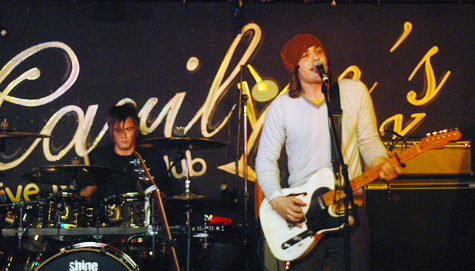
Next up was Owltrain, who with their more typical rock-band setup (two guitars, bass, keys, drums), were able to really up the level of energy in the room, with a sound reminiscent of bands like Mute Math, Minus the Bear, Coldplay and Radiohead.
The band’s most notable feature was the incredible performance of Owltrain’s drummer, Justin Barnes. The guy was a machine, and he looked so at home behind his kit it would make any percussionist want to practice more. (Even then they still probably wouldn’t have the chops this guy does.)
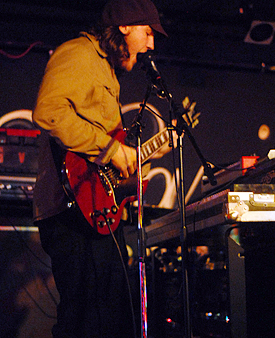
Barnes may have been the standout member of the group, but that doesn’t mean the other members didn’t shine as well. Jeffery LaTour, who played primarily guitar and some keys but sang backup vocals as well, made great use of his effects pedals and looped samples. He also was singing through what I later learned was some type of old telephone, rigged up as a microphone, which served as a very unique, lo-fi filter for his soaring voice. Jack Matranga, the group’s lead singer who also switched between guitar and bass, played some rather technical parts on bass and guitar while maintaining his breath and pitch control quite well. Finally, Danny Cocke, who mostly played bass but wound up with a guitar in his hands for a few songs, rounded out their sound perfectly with his effortless playing. The biggest crowd pleasers were “Harmony Cannons,” “Green Key,” and the set closer, “1984,” which included an incredible buildup at the end where sounds were layered upon one another until it came to an abrupt end, leaving the crowd mesmerized.
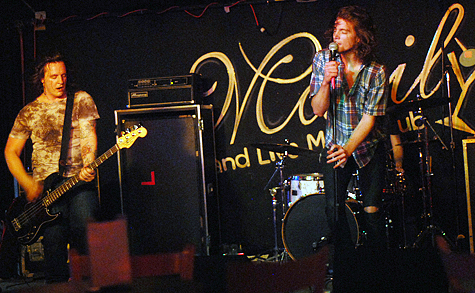
Rounding out the night was In Leaves, a brand new band to hit the Sacramento scene. Considering this was only their second performance as a full band, In Leaves was quite impressive and loud—very loud. With their amps set to 11, In Leaves proceeded to make everyone in the room’s ears bleed, but in a good way. In between songs, lead singer JJ Dunlap’s voice sounded destroyed, but during the songs he was great, proving how much of a trooper he really is. The band really started to shine when Dunlap dropped his guitar (not literally) and became more of an energetic frontman with his long shaggy hair in his face, a hole in his jeans and tambourine in hand as he furiously danced around the stage. His vocal style is similar to that of Caleb Followill of the popular band Kings of Leon—so watch out KWOD, you might be spinning In Leaves soon.
At the end of their very rockin’ set, In Leaves walked off stage with the microphone swinging from the rafters and feedback from the bass amp permeating through the room. The sound guy had a “WTF?” look on his face and everyone else was making sure they weren’t deaf. Hearing is overrated anyways.
Luckily, the only fireworks all night were of the musical variety, Abbey’s comments notwithstanding. Breaking up can be hard to do.

